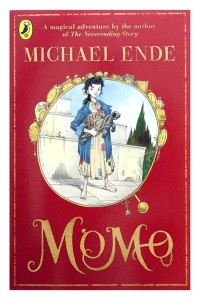 Momo, or Momo and The Grey Gentlemen is the translated title of a book by the German author Michael Ende. Ende also wrote the famous fantasy novel which was re-imagined into the 1984 film The Neverending Story. Momo is a philosophical work of fantasy fiction which can be enjoyed by both adults and children alike. It deals with the concept of time and the differences between how children view the world and how adults seek to manage their time. Some have even postulated that it is a critique of consumerism and an exploration into the Zen Buddhist conceptualisation of time.
Momo, or Momo and The Grey Gentlemen is the translated title of a book by the German author Michael Ende. Ende also wrote the famous fantasy novel which was re-imagined into the 1984 film The Neverending Story. Momo is a philosophical work of fantasy fiction which can be enjoyed by both adults and children alike. It deals with the concept of time and the differences between how children view the world and how adults seek to manage their time. Some have even postulated that it is a critique of consumerism and an exploration into the Zen Buddhist conceptualisation of time.
The protagonist, Momo, arrives in an unnamed town’s amphitheatre one day out of the blue. Unable to read, count, or write, she is also incapable of discerning exactly how old she is: when asked she simply states that she has “always been around”. However Momo’s ability to listen to her new friends in the village, to help solve their problems and grievances prove to be more useful than any literary abilities that she could have. Momo is also good at making up fun games for the children of the village to play, however as time passes she finds more and more of the children are mysteriously unable to come out and play.
We discover that this is due to the arrival of The Grey Gentlemen, who are urging the people of the village to give them their time to be put into a Timesaving Bank where it will be held for an undetermined length of time but with the promise of being repaid one day with interest. However due to the people of the village giving all of their time to The Grey Gentlemen, they no longer have time for things that are considered ‘time wasting’ to them. Arts, crafts, storytelling, games, and even sleeping fall by the wayside to make room for more important and grown up things like work. In reality, the more time people give to the Grey Gentlemen the less time they have to spend on the things they enjoy. As you can imagine, the town soon gets very boring and the people become very stressed and unhappy. Momo refuses The Grey Gentlemen’s offer to save her time for her and she soon becomes their enemy.
Instead, she sets out on an adventure to get back the time that has been taken by the evil Grey Gentlemen and return it to the people so that they can enjoy living once again. With the help of her friends Master Secundus Minutus Hora the Master of Time, and Cassiopeia (a tortoise who can communicate through writing on her shell and can see thirty minutes into the future!) Momo travels to the place where all time is created and saved. There she seeks to return what has been wrongly taken from mankind by The Grey Gentlemen.
I think what makes Momo such an inspirational literary girl is her refusal to follow the trend. She sets out her own path in life and sticks to it, living in the moment and doing what makes her happy. By doing this she is able to think clearly and listen to others, helping them with problems and giving out advice which is wise beyond her years. Though we never actually find out the age of Momo, it makes sense to me to think of her as a young girl who is full of the innocence of childhood and compassion for others. Momo’s character contrasts with the adult concept of time and the need to save it and cut out any unnecessary uses of it. I read this book just after I left high school before going to university and it made me very aware of the fact that, even though I was moving into the adult world and growing up, it is always important to make time for the things I enjoy and to pursue my passions in life. I have Momo to thank for that.
-Molly Gibb
Junior Girl
Girl Museum Inc.
